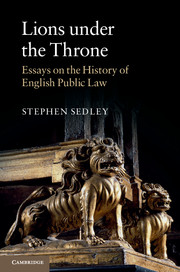Book contents
- Frontmatter
- Epigraph
- Dedication
- Contents
- Preface
- Introduction
- Part I Histories
- 1 Lions in winter: public law in the twentieth century
- 2 The dark satanic mills: the Victorian state
- 3 New corn from old fields: the Hanoverian harvest
- 4 Parchment in the fire: public law in the Interregnum
- 5 The future of public law
- Part II Themes
- Index
2 - The dark satanic mills: the Victorian state
from Part I - Histories
Published online by Cambridge University Press: 05 November 2015
- Frontmatter
- Epigraph
- Dedication
- Contents
- Preface
- Introduction
- Part I Histories
- 1 Lions in winter: public law in the twentieth century
- 2 The dark satanic mills: the Victorian state
- 3 New corn from old fields: the Hanoverian harvest
- 4 Parchment in the fire: public law in the Interregnum
- 5 The future of public law
- Part II Themes
- Index
Summary
When William Blake, in a prefatory verse to the epic poem Milton which he etched between 1804 and 1808, asked whether Jerusalem had been “builded here Among these dark Satanic Mills”, he was looking back in time. But when in the next stanza he called for his bow of burning gold and his arrows of desire and promised to fight on “Till we have built Jerusalem In England's green & pleasant land”, he was speaking for the generation which was to bring about the administrative and legal changes that did much to shape modern public law.
The Industrial Revolution
Great Britain's massive commercial, industrial and imperial takeoff in the nineteenth century was unanticipated, unprecedented, unplanned and pretty much uncontrolled. We have learnt to call it the Industrial Revolution, but the Victorians saw the spectacular growth of their trade and industry as progress rather than revolution. In a sense they were right. It was the conditions of the people which were most obviously revolutionised, as hundreds of thousands of displaced rural workers and famine-stricken immigrants swarmed into Britain's conurbations. The consequent proliferation of pollution, waste, disease, injury, poverty and unplanned development drove the more farsighted members of the political class into action and the courts from time to time into reaction.
This chapter looks at three interlocking elements of this teeming story: the use by Parliament of primary legislation to regulate commerce and industry, principally by hugely expanding executive and devolved powers; the deployment of these powers by central and local government and official bodies; and the use by the judiciary of old and new legal tools to keep public administration within the bounds of legality as the judges understood it. It was in the course of this multi-faceted process that much of what we have learned to regard as modern public law took shape. Why another generation of judges let it go to sleep for the first half of the twentieth century, and how in the latter half of that century it rose from what seemed to be the grave, are the two main questions addressed in the previous chapter.
- Type
- Chapter
- Information
- Lions under the ThroneEssays on the History of English Public Law, pp. 45 - 69Publisher: Cambridge University PressPrint publication year: 2015



